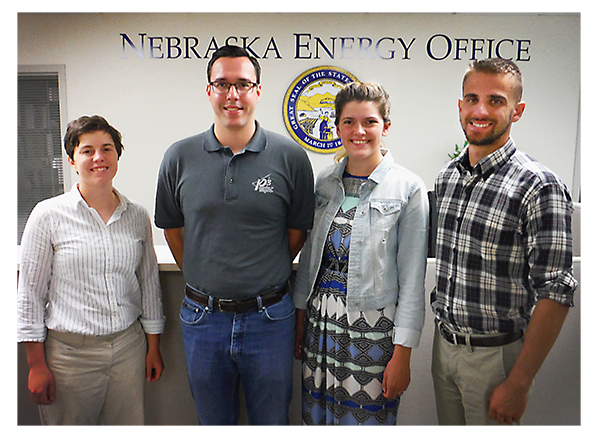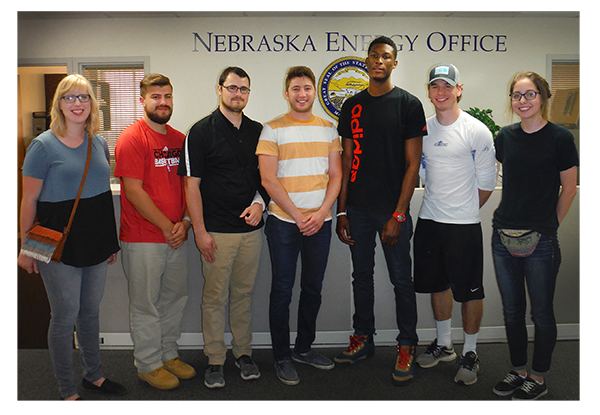Since 1992, the Nebraska Energy Office has used university student interns to accomplish a variety energy efficiency initiatives funded in part by various federal awards. In April, 1995, the Energy Office, based on its earlier experiences, published The Intern Solution — Ways to use student interns to reduce the costs of energy and environmental surveys.
In 2016, the Energy Office received a State Energy Program Competitive Award![]() through the U.S. Department of Energy
through the U.S. Department of Energy![]() to work with Nebraska local governments over a period of three years to address the energy use of wastewater facilities in municipalities with a population of 10,000 or less.
to work with Nebraska local governments over a period of three years to address the energy use of wastewater facilities in municipalities with a population of 10,000 or less.
During the summer of 2016 four student interns from the University of Nebraska-Lincoln (UNL) Partners in Pollution Prevention Program (P3 Program)![]() collected data and energy usage on more than 100 facilities and completed preliminary assessments on more than 80 of those facilities. Of those facilities, 33 of them had an actual energy intensity that was at least 15 percent higher than predicted by the P3 Program models, suggesting there would be ways to improve efficiency. This summer, 2017, five student interns from the P3 Program are surveying fifteen of the 33 facilities and authoring comprehensive energy studies with the technical support of the P3 Program professional staff covering the operation of the facilities surveyed. The completed studies detailing recommended improvements will be delivered to the 15 municipalities at the end of the summer for their consideration in undertaking the identified improvements with either low cost financing through the Energy Office’s Dollar and Energy Saving Loan Program or some other financing option available to the municipality.
collected data and energy usage on more than 100 facilities and completed preliminary assessments on more than 80 of those facilities. Of those facilities, 33 of them had an actual energy intensity that was at least 15 percent higher than predicted by the P3 Program models, suggesting there would be ways to improve efficiency. This summer, 2017, five student interns from the P3 Program are surveying fifteen of the 33 facilities and authoring comprehensive energy studies with the technical support of the P3 Program professional staff covering the operation of the facilities surveyed. The completed studies detailing recommended improvements will be delivered to the 15 municipalities at the end of the summer for their consideration in undertaking the identified improvements with either low cost financing through the Energy Office’s Dollar and Energy Saving Loan Program or some other financing option available to the municipality.
The fifteen facilities being studied are in Ainsworth, Albion, Bassett, Beemer, Bennet, Cedar Rapids, Central City, Coleridge, Dodge, Elgin, Geneva, Kimball, Syracuse, Valentine, and Wayne.
 University of Nebraska-Lincoln 2017 student interns conducting assessments on wastewater facilities are: (L-R) Elizabeth Regier from Julesburg, CO, a Senior in Civil Engineering; Steven Hanna from Omaha, NE, a Graduate Student in Environmental Engineering; Brittlin Hoge from Omaha, NE, a Senior in Chemical Engineering; and Ryan Yates from Clay Center, NE, a Junior in Mechanical Engineering. Not pictured: Matthew Thompson from Elkhorn, NE, a Graduate Student in Environmental Engineering.
University of Nebraska-Lincoln 2017 student interns conducting assessments on wastewater facilities are: (L-R) Elizabeth Regier from Julesburg, CO, a Senior in Civil Engineering; Steven Hanna from Omaha, NE, a Graduate Student in Environmental Engineering; Brittlin Hoge from Omaha, NE, a Senior in Chemical Engineering; and Ryan Yates from Clay Center, NE, a Junior in Mechanical Engineering. Not pictured: Matthew Thompson from Elkhorn, NE, a Graduate Student in Environmental Engineering.In addition to the wastewater project, the Energy Office again was successful in receiving a State Energy Program Competitive Award in 2017 through the U.S. Department of Energy for the Nebraska Initiative — Benchmarking and Beyond project. The goals of this three year project are to:
In May of 2017, the Project Director from the University of Nebraska-Omaha (UNO) College of Business Administration, Nebraska Business Development Center![]() trained student interns to collect, assess and enter basic benchmarking data for state and local government buildings in ENERGY STAR® Portfolio Manager
trained student interns to collect, assess and enter basic benchmarking data for state and local government buildings in ENERGY STAR® Portfolio Manager![]() and produce the ENERGY STAR reports. The seven student interns trained on Portfolio Manager for the summer of 2017 are students from UNL’s College of Architecture
and produce the ENERGY STAR reports. The seven student interns trained on Portfolio Manager for the summer of 2017 are students from UNL’s College of Architecture![]() and The Durham School of Architectural Engineering and Construction
and The Durham School of Architectural Engineering and Construction![]()
Since the initial benchmarking training, the student interns have been entering baseline building information into ENERGY STAR Portfolio Manager on 3,815 state-owned building identified by the Energy Office from the Building Inventory Data provided by the Nebraska Department of Administrative Services, Building Services Division.
The seven student interns trained for the Nebraska Initiative — Benchmarking and Beyond project were also trained in May of 2017 by technical staff from Cadmus Group, Boise, ID![]() ; Central
; Central![]() , Northeast
, Northeast![]() and Northwest
and Northwest![]() Community Action Agencies; and the Energy Office on the U.S. Department of Energy’s methodology of data collection, the data to be collected and the 2009 International Energy Code Compliance (IECC) Data Collection Form — Home to be used in Nebraska’s Residential Baseline Study.
Community Action Agencies; and the Energy Office on the U.S. Department of Energy’s methodology of data collection, the data to be collected and the 2009 International Energy Code Compliance (IECC) Data Collection Form — Home to be used in Nebraska’s Residential Baseline Study.
The study is using the student interns and Community Action Agency technical staff to field visit single family, detached, new construction homes to collect a full set of 63 data points of eight key individual energy code requirement with the largest energy impacts. These requirements are envelope air tightness (ACH50); window SHC and U-factor; wall insulation (R-value); ceiling insulation (R-value); lighting (percent of HE lamps); foundation insulation (R-value); and duct leakage.
The Pacific Northwest National Laboratory (PNNL)![]() provided the Energy Office with a random sample of the Nebraska counties where the 63 full sets of data points needed to be collected. They were 20 in Douglas County; 17 in Sarpy County; 11 in Lancaster County; three in Buffalo County; two each in Adams, Hall and Madison Counties; and one each in Cass, Dodge, Hamilton, Platte, Seward and Washington Counties. The data collected from the sample will be submitted to PNNL who will analyze and model the data and provide a report to the Energy Office on the level of energy code compliance in the state based on the sample.
provided the Energy Office with a random sample of the Nebraska counties where the 63 full sets of data points needed to be collected. They were 20 in Douglas County; 17 in Sarpy County; 11 in Lancaster County; three in Buffalo County; two each in Adams, Hall and Madison Counties; and one each in Cass, Dodge, Hamilton, Platte, Seward and Washington Counties. The data collected from the sample will be submitted to PNNL who will analyze and model the data and provide a report to the Energy Office on the level of energy code compliance in the state based on the sample.
To date the student interns have been collecting data in all the counties in the sample, with data collection complete in Lancaster and Seward Counties and a substantial amount of the necessary data collected in Douglas and Sarpy Counties.
 The student interns working on government building benchmarking and data collection are: (L-R) Alaina Boudreau from Minden, NE, a Graduate Student in Architecture; Jonathan Amari from Vernon Hills, IL, a Graduate Student in Architecture; Zach Beckman from Omaha, NE, a Senior in Construction Management; Omar Al Mulki from Hama, Syria, with a Bachelor’s Degree in Architecture; Davielle Phillips from Chicago, IL, a Graduate Student in Architecture and Business Administration; Nathan Boon from Grand Island, NE, a Sophomore in Construction Management and Violet Bast from Omaha, NE, a Senior in Architecture. Not pictured: Aaron Thompson from Milford, NE, a Graduate Student in Construction Management, who also has been participating in the residential baseline study as part of a research project for his degree.
The student interns working on government building benchmarking and data collection are: (L-R) Alaina Boudreau from Minden, NE, a Graduate Student in Architecture; Jonathan Amari from Vernon Hills, IL, a Graduate Student in Architecture; Zach Beckman from Omaha, NE, a Senior in Construction Management; Omar Al Mulki from Hama, Syria, with a Bachelor’s Degree in Architecture; Davielle Phillips from Chicago, IL, a Graduate Student in Architecture and Business Administration; Nathan Boon from Grand Island, NE, a Sophomore in Construction Management and Violet Bast from Omaha, NE, a Senior in Architecture. Not pictured: Aaron Thompson from Milford, NE, a Graduate Student in Construction Management, who also has been participating in the residential baseline study as part of a research project for his degree.